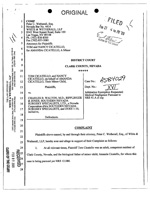Sunday, Sept. 19, 2010 | 2 a.m.
Do No Harm: Hospital Care in Las Vegas, Part 3
- Patients at risk under the knife
- Routine surgery, harrowing result
- A cry for help
- Doctors avoid discipline
- Colorado transparency unique
- Last drumroll
- How the Sun identified surgical injuries
Share your stories
Michael Skolnik was having seizures. His doctor was pressing for brain surgery.
Michael's mother, Patty Skolnik, searched for information about the neurosurgeon who would perform the operation. The Colorado resident found nothing useful from her state's doctor-licensing board, only "name, rank and serial number," she said.
Still, there was nothing to ward her off, so her son had the surgery. She regrets that decision. During the operation, in 2001, surgical errors caused Michael irreparable brain damage.
It was only later that Skolnik learned the surgeon had a history of malpractice in another state. And moreover, she learned the surgery had not been necessary.
Michael died three years later at age 25.
From that tragedy was born Citizens for Patient Safety, an advocacy group led by Skolnik that is initiating reforms, including the 2007 Michael Skolnik Medical Transparency Act, to provide important information about the quality of Colorado health care providers.
Colorado physicians helped pass the law. The Colorado Medical Society, the state's largest physician group, acknowledged the need to inform consumers.
"This is helpful information for our patients and useful to put out there," said Dr. Mark Laitos, the society's immediate past president.
Nevadans, like residents of most states, have limited information about physicians.
The Nevada Board of Medical Examiners' physician profiles include board complaints and disciplinary decisions, and medical malpractice payouts. But only the most extreme cases of misconduct result in board discipline and lawsuit payments — and those take years to come to fruition.
Colorado regulators offer far more detail about physicians' track records. As a result of the Skolnik Act, the Colorado Regulatory Agencies Department posts on its website malpractice and discipline information, plus the following:
• Ownership of health care-related businesses.
• Board certifications.
• Affiliations with hospitals and health care facilities.
• Health care-related employment contracts.
• Agreements and stipulations to temporarily cease medical practice.
• Involuntary actions taken against hospital or facility privileges since 1990.
• Involuntary surrender of Drug Enforcement Administration registration.
• Criminal convictions or plea arrangements for felonies and crimes of moral turpitude.
• Any denial of coverage by a medical malpractice insurance company.
Some doctors were defensive when the law was proposed, because they were concerned about becoming the target of lawsuits, Laitos said. But they cooperated with Skolnik and negotiated terms that were agreeable, he said.
No one testified against the Skolnik Act.
The information is a starting point for discussions about quality of care between patients and doctors, Skolnik said. If a doctor has a malpractice settlement on his record, patients can ask about it and learn the circumstances, which may be understandable, she said.
A patient should beware of a doctor who has had hospital privileges suspended or been denied malpractice insurance — which may be indications of bigger problems, Skolnik said.
"To be an informed consumer you have to have the tools to get the information you need to make a decision," Skolnik said. "The first part is knowing who manages that care, even if it's just to have a point of discussion with the doctor."
Doctors do not go into an operation with the intent of harming a patient, Skolnik said, "but they do need to be accountable when they're arrogant and use bad judgment and they're not listening."
The improved transparency also gives doctors the information they need to justify getting rid of the few bad apples who do most of the damage, Skolnik said.
Physicians can see the performance records of their peers. The information is valuable for doctors making referrals, she said.
Colorado legislators expanded the Skolnik Act this year to include chiropractors, dentists, optometrists, psychologists and counselors, physician assistants, physical therapists and other health care providers.
Building on their collaboration to pass the transparency laws, Skolnik and the Colorado medical community are working with hospital officials to find other ways to improve patient safety.
"The culture has really changed in Colorado," said Dr. Jan Kief, Colorado Medical Society speaker of the house.



Join the Discussion:
Check this out for a full explanation of our conversion to the LiveFyre commenting system and instructions on how to sign up for an account.
Full comments policy